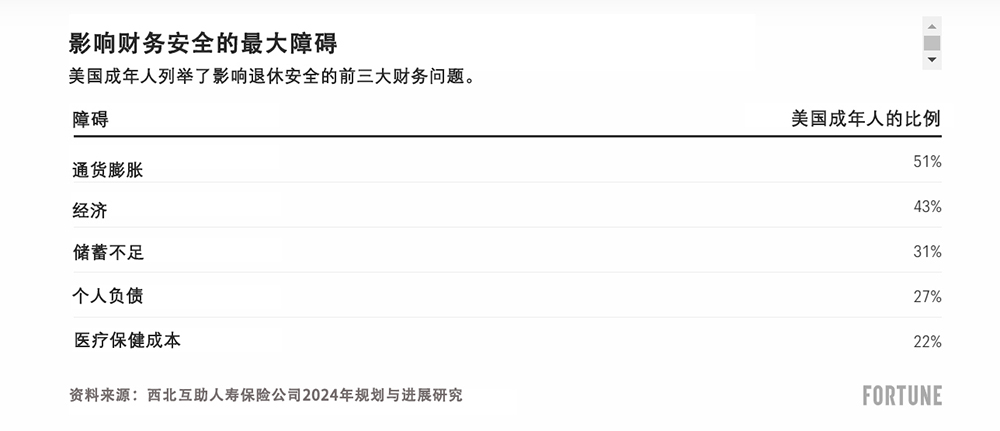
通貨膨脹、高利率,、動(dòng)蕩的就業(yè)市場(chǎng)和新冠疫情,,讓美國(guó)成年人對(duì)個(gè)人財(cái)務(wù)狀況感到更加焦慮,有更多的人稱他們對(duì)個(gè)人財(cái)務(wù)狀況的安全感,,跌至十多年來(lái)的最低谷,。但他們也表示,今年仍然計(jì)劃進(jìn)行消費(fèi),,包括外出就餐,、度假和參加其他形式的娛樂活動(dòng)。
這是西北互助人壽保險(xiǎn)公司(Northwestern Mutual)的“2024年規(guī)劃與進(jìn)展研究”(2024 Planning and Progress Study)的一些結(jié)果,。該項(xiàng)研究在今年1月調(diào)查了4,588名美國(guó)成年人,。有三分之一(33%)的受訪者表示在財(cái)務(wù)方面缺乏安全感,高于2023年的27%,,并且達(dá)到了自2012年西北互助人壽保險(xiǎn)公司開始進(jìn)行財(cái)務(wù)安全調(diào)查以來(lái)的最高水平,。只有41%的受訪者稱在財(cái)務(wù)方面非常有安全感,這是該報(bào)告歷史上的最低水平,。
西北互助人壽保險(xiǎn)公司的首席客戶官克里斯蒂安·米切爾在關(guān)于此次調(diào)查的新聞發(fā)布會(huì)上指出,,出現(xiàn)這種趨勢(shì)有很多原因。雖然從通脹降溫,、失業(yè)率更低和股市暴漲等傳統(tǒng)指標(biāo)來(lái)看,,美國(guó)經(jīng)濟(jì)目前似乎更加強(qiáng)勁,但許多美國(guó)人的擔(dān)憂依舊揮之不去,。自2020年以來(lái),,美國(guó)人經(jīng)歷了導(dǎo)致失業(yè)率飆升的新冠疫情、創(chuàng)數(shù)十年新高的通貨膨脹,,還有利率上漲,。爭(zhēng)論不休的總統(tǒng)大選和動(dòng)蕩的全球局勢(shì),可能有害無(wú)利,。
“很難有積極的心態(tài)”
最近的偏見正在影響許多美國(guó)人,,尤其是在面對(duì)物價(jià)上漲的時(shí)候,。報(bào)告稱,通貨膨脹“是導(dǎo)致這種不安全感顯而易見的原因”,,它讓許多積極的經(jīng)濟(jì)新聞黯然失色,。一半以上的美國(guó)成年人認(rèn)為,通貨膨脹是影響財(cái)務(wù)安全感的最大障礙,。
2022年年中,,美國(guó)的通脹率達(dá)到9%,創(chuàng)40年新高,,而且目前仍舊高于美聯(lián)儲(chǔ)(Federal Reserve)2%的目標(biāo),。尤其是高企的食品價(jià)格和房?jī)r(jià),讓美國(guó)人的預(yù)算捉襟見肘:過(guò)去三年,,食品價(jià)格上漲了兩位數(shù),,而房?jī)r(jià)更是達(dá)到史上最高水平。
雖然最近通脹有所回落,,但一半以上的受訪者預(yù)計(jì)通脹率會(huì)繼續(xù)升高,,而且只有9%的家庭表示其收入增長(zhǎng)速度更快。美聯(lián)儲(chǔ)稱,,美國(guó)人希望物價(jià)恢復(fù)到新冠疫情之前的水平,,但這并沒有發(fā)生。
米切爾在新聞稿里說(shuō):“‘財(cái)務(wù)沖擊疲勞’和脆弱,,讓人們很難對(duì)個(gè)人財(cái)務(wù)安全有積極的心態(tài),。盡管經(jīng)濟(jì)持續(xù)增長(zhǎng),但在過(guò)去幾年,,美國(guó)人卻不得不忍受一次次的財(cái)務(wù)動(dòng)蕩,,當(dāng)你不知道接下來(lái)會(huì)發(fā)生什么時(shí),就很難保持積極的心態(tài),?!?/p>

美聯(lián)儲(chǔ)為了控制通脹而啟動(dòng)的加息,加劇了美國(guó)人對(duì)經(jīng)濟(jì)的悲觀立場(chǎng),。米切爾指出,,年輕的千禧一代和Z世代背負(fù)債務(wù)或借款的成本變得更高。
2023年,,美國(guó)的信用卡債務(wù)總額首次超過(guò)1萬(wàn)億美元(部分原因是通貨膨脹),,而且依然在持續(xù)增長(zhǎng),因此這個(gè)問題變得尤其重要,。Credit Karma的數(shù)據(jù)顯示,,年輕人受到的影響最為嚴(yán)重。
LendingClub的首席客戶官馬克·埃利奧特最近對(duì)《財(cái)富》雜志表示:“這些消費(fèi)者日益依賴信貸度日,。一個(gè)人背負(fù)的債務(wù)水平更高,,會(huì)阻礙其實(shí)現(xiàn)財(cái)務(wù)目標(biāo),,而且會(huì)給經(jīng)濟(jì)健康和心理健康帶來(lái)長(zhǎng)期風(fēng)險(xiǎn)?!?/p>
此外,,抵押貸款利率和租金對(duì)消費(fèi)者信心的影響,難以用語(yǔ)言來(lái)形容,。據(jù)Redfin統(tǒng)計(jì),,抵押貸款中位數(shù)月還款額從2021年的1,500美元提高到超過(guò)2,600美元,而目前房東公開報(bào)價(jià)的租金自新冠疫情以來(lái)上漲了30%,。更多美國(guó)人沒有條件進(jìn)入房地產(chǎn)市場(chǎng),,同時(shí)每個(gè)月要支付的房租也越來(lái)越高。
經(jīng)濟(jì)學(xué)家們可能低估了加息對(duì)消費(fèi)者的傷害,。包括美國(guó)財(cái)政部的前部長(zhǎng)拉里·薩默斯在內(nèi)的一批研究人員發(fā)表的最新工作報(bào)告發(fā)現(xiàn),美國(guó)勞工統(tǒng)計(jì)局(Bureau of Labor Statistics)的官方消費(fèi)物價(jià)指數(shù),,并沒有充分考慮加息導(dǎo)致債務(wù)增多的情況,,尤其是抵押貸款,還有汽車貸款和信用卡債務(wù),。如果新通脹指標(biāo)中將加息考慮在內(nèi),,消費(fèi)者信心就會(huì)與生活成本上漲的趨勢(shì)更加匹配。
報(bào)告的作者表示:“消費(fèi)者不同于現(xiàn)代經(jīng)濟(jì)學(xué)家,,他們會(huì)把借款成本作為生活成本的一部分,。”而且“自2021年以來(lái),,普通住宅30年期抵押貸款的利息增加了三倍以上,。”
“有計(jì)劃消費(fèi)”
與此同時(shí),,美國(guó)人不見得計(jì)劃減少支出,。即使在高物價(jià)和高利率的環(huán)境下,消費(fèi)也使得美國(guó)經(jīng)濟(jì)得以維持增長(zhǎng),。報(bào)告發(fā)現(xiàn),,59%的成年人表示在2024年,非必需品消費(fèi)將維持不變甚至增加,。Z世代最有可能表示不會(huì)減少支出,,而X世代最有可能控制支出。
米切爾提到了美聯(lián)儲(chǔ)最近的一份報(bào)告,。這份報(bào)告顯示自新冠疫情爆發(fā)以來(lái),,40歲以下美國(guó)人的資產(chǎn)凈值增長(zhǎng)速度最快。反過(guò)來(lái),,他們可能對(duì)自己的消費(fèi)能力和實(shí)現(xiàn)其他目標(biāo)的能力更有信心,,例如儲(chǔ)蓄和投資目標(biāo)等,。
他還指出,美國(guó)人的財(cái)務(wù)安全感和繼續(xù)消費(fèi)的計(jì)劃之間貌似出現(xiàn)了脫節(jié),,這是在警告消費(fèi)者不要忽視長(zhǎng)期后果,。
米切爾告訴《財(cái)富》雜志:“如果把美好的事物或體驗(yàn)作為合理理財(cái)計(jì)劃的一部分,那么犒勞自己就會(huì)讓你感覺很棒,,但如果這是計(jì)劃外的支出,,任何情感收益就都會(huì)很短暫,甚至適得其反,。我的建議是:如果你想要揮霍一番,,那就去做,但要將它們納入計(jì)劃,,這樣可以保證你的財(cái)務(wù)安全感,,而不會(huì)讓你對(duì)它們產(chǎn)生內(nèi)疚感?!保ㄘ?cái)富中文網(wǎng))
譯者:劉進(jìn)龍
審校:汪皓
通貨膨脹,、高利率、動(dòng)蕩的就業(yè)市場(chǎng)和新冠疫情,,讓美國(guó)成年人對(duì)個(gè)人財(cái)務(wù)狀況感到更加焦慮,,有更多的人稱他們對(duì)個(gè)人財(cái)務(wù)狀況的安全感,跌至十多年來(lái)的最低谷,。但他們也表示,,今年仍然計(jì)劃進(jìn)行消費(fèi),包括外出就餐,、度假和參加其他形式的娛樂活動(dòng),。
這是西北互助人壽保險(xiǎn)公司(Northwestern Mutual)的“2024年規(guī)劃與進(jìn)展研究”(2024 Planning and Progress Study)的一些結(jié)果。該項(xiàng)研究在今年1月調(diào)查了4,588名美國(guó)成年人,。有三分之一(33%)的受訪者表示在財(cái)務(wù)方面缺乏安全感,,高于2023年的27%,并且達(dá)到了自2012年西北互助人壽保險(xiǎn)公司開始進(jìn)行財(cái)務(wù)安全調(diào)查以來(lái)的最高水平,。只有41%的受訪者稱在財(cái)務(wù)方面非常有安全感,,這是該報(bào)告歷史上的最低水平。
西北互助人壽保險(xiǎn)公司的首席客戶官克里斯蒂安·米切爾在關(guān)于此次調(diào)查的新聞發(fā)布會(huì)上指出,,出現(xiàn)這種趨勢(shì)有很多原因,。雖然從通脹降溫、失業(yè)率更低和股市暴漲等傳統(tǒng)指標(biāo)來(lái)看,,美國(guó)經(jīng)濟(jì)目前似乎更加強(qiáng)勁,,但許多美國(guó)人的擔(dān)憂依舊揮之不去。自2020年以來(lái),,美國(guó)人經(jīng)歷了導(dǎo)致失業(yè)率飆升的新冠疫情,、創(chuàng)數(shù)十年新高的通貨膨脹,,還有利率上漲。爭(zhēng)論不休的總統(tǒng)大選和動(dòng)蕩的全球局勢(shì),,可能有害無(wú)利,。
“很難有積極的心態(tài)”
最近的偏見正在影響許多美國(guó)人,尤其是在面對(duì)物價(jià)上漲的時(shí)候,。報(bào)告稱,,通貨膨脹“是導(dǎo)致這種不安全感顯而易見的原因”,它讓許多積極的經(jīng)濟(jì)新聞黯然失色,。一半以上的美國(guó)成年人認(rèn)為,,通貨膨脹是影響財(cái)務(wù)安全感的最大障礙。
2022年年中,,美國(guó)的通脹率達(dá)到9%,,創(chuàng)40年新高,而且目前仍舊高于美聯(lián)儲(chǔ)(Federal Reserve)2%的目標(biāo),。尤其是高企的食品價(jià)格和房?jī)r(jià),,讓美國(guó)人的預(yù)算捉襟見肘:過(guò)去三年,食品價(jià)格上漲了兩位數(shù),,而房?jī)r(jià)更是達(dá)到史上最高水平。
雖然最近通脹有所回落,,但一半以上的受訪者預(yù)計(jì)通脹率會(huì)繼續(xù)升高,,而且只有9%的家庭表示其收入增長(zhǎng)速度更快。美聯(lián)儲(chǔ)稱,,美國(guó)人希望物價(jià)恢復(fù)到新冠疫情之前的水平,,但這并沒有發(fā)生。
米切爾在新聞稿里說(shuō):“‘財(cái)務(wù)沖擊疲勞’和脆弱,,讓人們很難對(duì)個(gè)人財(cái)務(wù)安全有積極的心態(tài),。盡管經(jīng)濟(jì)持續(xù)增長(zhǎng),但在過(guò)去幾年,,美國(guó)人卻不得不忍受一次次的財(cái)務(wù)動(dòng)蕩,,當(dāng)你不知道接下來(lái)會(huì)發(fā)生什么時(shí),就很難保持積極的心態(tài),?!?/p>
美聯(lián)儲(chǔ)為了控制通脹而啟動(dòng)的加息,加劇了美國(guó)人對(duì)經(jīng)濟(jì)的悲觀立場(chǎng),。米切爾指出,,年輕的千禧一代和Z世代背負(fù)債務(wù)或借款的成本變得更高。
2023年,,美國(guó)的信用卡債務(wù)總額首次超過(guò)1萬(wàn)億美元(部分原因是通貨膨脹),,而且依然在持續(xù)增長(zhǎng),,因此這個(gè)問題變得尤其重要。Credit Karma的數(shù)據(jù)顯示,,年輕人受到的影響最為嚴(yán)重,。
LendingClub的首席客戶官馬克·埃利奧特最近對(duì)《財(cái)富》雜志表示:“這些消費(fèi)者日益依賴信貸度日。一個(gè)人背負(fù)的債務(wù)水平更高,,會(huì)阻礙其實(shí)現(xiàn)財(cái)務(wù)目標(biāo),,而且會(huì)給經(jīng)濟(jì)健康和心理健康帶來(lái)長(zhǎng)期風(fēng)險(xiǎn)?!?/p>
此外,,抵押貸款利率和租金對(duì)消費(fèi)者信心的影響,難以用語(yǔ)言來(lái)形容,。據(jù)Redfin統(tǒng)計(jì),,抵押貸款中位數(shù)月還款額從2021年的1,500美元提高到超過(guò)2,600美元,而目前房東公開報(bào)價(jià)的租金自新冠疫情以來(lái)上漲了30%,。更多美國(guó)人沒有條件進(jìn)入房地產(chǎn)市場(chǎng),,同時(shí)每個(gè)月要支付的房租也越來(lái)越高。
經(jīng)濟(jì)學(xué)家們可能低估了加息對(duì)消費(fèi)者的傷害,。包括美國(guó)財(cái)政部的前部長(zhǎng)拉里·薩默斯在內(nèi)的一批研究人員發(fā)表的最新工作報(bào)告發(fā)現(xiàn),,美國(guó)勞工統(tǒng)計(jì)局(Bureau of Labor Statistics)的官方消費(fèi)物價(jià)指數(shù),并沒有充分考慮加息導(dǎo)致債務(wù)增多的情況,,尤其是抵押貸款,,還有汽車貸款和信用卡債務(wù)。如果新通脹指標(biāo)中將加息考慮在內(nèi),,消費(fèi)者信心就會(huì)與生活成本上漲的趨勢(shì)更加匹配,。
報(bào)告的作者表示:“消費(fèi)者不同于現(xiàn)代經(jīng)濟(jì)學(xué)家,他們會(huì)把借款成本作為生活成本的一部分,?!倍摇白?021年以來(lái),普通住宅30年期抵押貸款的利息增加了三倍以上,?!?/p>
“有計(jì)劃消費(fèi)”
與此同時(shí),美國(guó)人不見得計(jì)劃減少支出,。即使在高物價(jià)和高利率的環(huán)境下,,消費(fèi)也使得美國(guó)經(jīng)濟(jì)得以維持增長(zhǎng)。報(bào)告發(fā)現(xiàn),,59%的成年人表示在2024年,,非必需品消費(fèi)將維持不變甚至增加。Z世代最有可能表示不會(huì)減少支出,而X世代最有可能控制支出,。
米切爾提到了美聯(lián)儲(chǔ)最近的一份報(bào)告,。這份報(bào)告顯示自新冠疫情爆發(fā)以來(lái),40歲以下美國(guó)人的資產(chǎn)凈值增長(zhǎng)速度最快,。反過(guò)來(lái),,他們可能對(duì)自己的消費(fèi)能力和實(shí)現(xiàn)其他目標(biāo)的能力更有信心,例如儲(chǔ)蓄和投資目標(biāo)等,。
他還指出,,美國(guó)人的財(cái)務(wù)安全感和繼續(xù)消費(fèi)的計(jì)劃之間貌似出現(xiàn)了脫節(jié),這是在警告消費(fèi)者不要忽視長(zhǎng)期后果,。
米切爾告訴《財(cái)富》雜志:“如果把美好的事物或體驗(yàn)作為合理理財(cái)計(jì)劃的一部分,,那么犒勞自己就會(huì)讓你感覺很棒,但如果這是計(jì)劃外的支出,,任何情感收益就都會(huì)很短暫,,甚至適得其反。我的建議是:如果你想要揮霍一番,,那就去做,,但要將它們納入計(jì)劃,這樣可以保證你的財(cái)務(wù)安全感,,而不會(huì)讓你對(duì)它們產(chǎn)生內(nèi)疚感,。”(財(cái)富中文網(wǎng))
譯者:劉進(jìn)龍
審校:汪皓
Inflation, high interest rates, a rocky job market, and the COVID-19 pandemic—they all have American adults feeling more anxious about money, with more people saying they’re the least secure about their finances in over a decade. But those same individuals also said they’re still planning to spend money on dining out and vacations and other forms of entertainment this year.
Those are some of the takeaways from Northwestern Mutual’s 2024 Planning and Progress Study, which surveyed 4,588 American adults in January. A full third of respondents, 33%, reported feeling financially insecure—up from 27% in 2023, and the highest share since Northwestern Mutual began measuring financial security in 2012. Just 41% of respondents reported feeling very financially secure, the smallest share in the report’s history.
There are any number of reasons for that, Christian Mitchell, chief customer officer at Northwestern Mutual, said at a press event for the survey. Though the economy appears stronger now according to traditional metrics like cooling inflation, lower unemployment, and a roaring stock market, many Americans have lingering concerns. Since just 2020, they’ve endured a pandemic that caused joblessness to spike, decades-high inflation, and rising interest rates. A contentious presidential election and global instability aren’t likely to help matters.
“It’s hard to feel positive”
That recency bias is weighing on many Americans, particularly when it comes to higher prices. Inflation is the “clear driver underpinning that insecurity,” according to the report, and it’s overshadowing much of the positive economic news. More than half of U.S. adults named it as the single largest obstacle to financial security.
Inflation reached 9% in mid-2022, the highest rate in 40 years, and it still remains above the Federal Reserve’s 2% target. High food and housing prices, in particular, are stretching budgets thin: Food prices are up double digits in the past three years, and housing costs have never been higher.
Though inflation has cooled recently, more than half of respondents are expecting it to keep increasing, and just 9% of households said their income is growing at a faster pace. Americans want prices back at pre-pandemic levels, the Federal Reserve has noted, but that isn’t happening.
“‘Financial shock fatigue’ and fragility are holding people back from positive feelings about their own financial security,” Mitchell said in a press release. “Despite the growing economy, Americans have had to endure one financial disruption after another over the last several years, and it’s hard to feel positive when you don’t know what’s around the corner.”
Higher interest rates—initiated by the Fed in order to combat inflation—are compounding Americans' pessimistic view of the economy. It's more expensive to have debt or borrow money for younger millennials and Gen Z than ever before, Mitchell noted.
That's especially important to consider as total credit card debt in the U.S. surpassed $1 trillion for the first time ever in 2023—partly due to inflation—and it keeps growing. Data from Credit Karma shows younger generations are getting hit the hardest.
"These consumers are increasingly relying on credit to get by," Mark Elliot, chief customer officer at LendingClub, recently told?Fortune. "Higher debt levels hamper one’s ability to achieve financial goals, but also pose long-term risks to economic well-being and mental health."
Plus, it's hard to overstate how mortgage interest rates and rents are affecting sentiment. The median monthly mortgage payment has increased from $1,500 in 2021 to over $2,600, according to Redfin, while current asking-rate rents are up 30% since the start of the pandemic. More Americans have been locked out of the housing market while also paying more and more each month to rent.
And economists actually may be underestimating just how much rising rates are harming consumers. A new working paper from a group of researchers, including former Treasury Secretary Larry Summers, finds that the official consumer price index from the Bureau of Labor Statistics doesn't fully account for how much more expensive rising interest rates make debt—particularly mortgages, but also car payments and credit card debt. When rising interest rates are accounted for in a new inflation measure, consumer sentiment matches up better with the rising cost of living.
"Consumers, unlike modern economists, consider the cost of money part of their cost of living," the authors note, and "the interest payment on a new 30-year mortgage for the average house has increased more than threefold since 2021."
“Build those moments into a plan”
At the same time, Americans aren't necessarily planning to slow down their spending, which has kept the economy afloat even amid high prices and high interest rates. The report finds 59% of adults say they'll spend the same or more on discretionary purchases in 2024. Gen Z is the most likely generation to say they aren't pulling back, while Gen X is most likely to reign in spending.
Mitchell pointed to a recent report from the Federal Reserve that showed how people under 40 have seen their net worths rise the fastest in the years since the pandemic. In turn, they may feel more confident in their ability to spend and still pursue other goals, like saving and investing.
He also noted the seeming disconnect between Americans' perception of their financial security and their plans to keep spending, warning consumers not to ignore longer-term consequences.
"Treating yourself to nice things or experiences can feel great if that’s part of a sound financial plan, but if it’s not planned for, any emotional benefits may be short-lived—or even turn upside down," Mitchell told Fortune. "My advice: If you want to splurge, then splurge, but build those moments into a plan so you can feel financially secure—and not guilty—about them."






